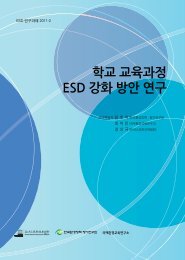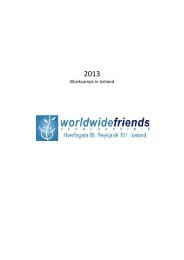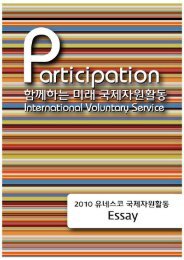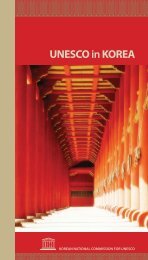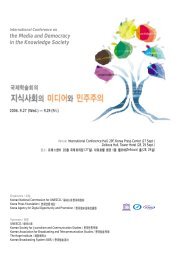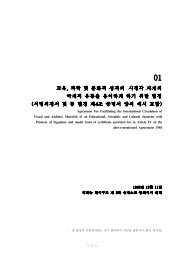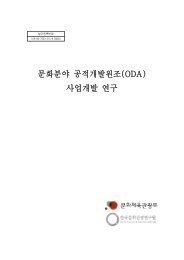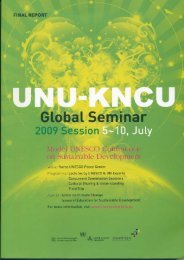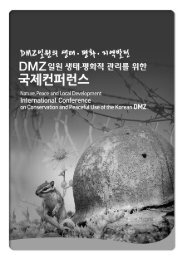íëìë³´ë2012문íì ë°ì ë¼ì´ëí ì´ë¸.pdf - ì ë¤ì¤ì½íêµììí
íëìë³´ë2012문íì ë°ì ë¼ì´ëí ì´ë¸.pdf - ì ë¤ì¤ì½íêµììí
íëìë³´ë2012문íì ë°ì ë¼ì´ëí ì´ë¸.pdf - ì ë¤ì¤ì½íêµììí
You also want an ePaper? Increase the reach of your titles
YUMPU automatically turns print PDFs into web optimized ePapers that Google loves.
alignment; and (c) increased awareness of the recipient country that culture is a variable for<br />
ensuring political, social, economic, and ecological sustainability as well as for fighting<br />
poverty.<br />
It is advisable to go beyond the conventional method of international development<br />
cooperation, which goes according to area and sector, and instead aim to “build a sustainable<br />
ecosystem” in recipient regions. For this purpose, it is vital to: (a) create/maintain basic<br />
infrastructure; (b) routinize capability-building programs to promote the independent<br />
operational capabilities of the public and/or private sector; and (c) establish unique<br />
cultural/artistic sensitivity and traditions.<br />
A respect for recipient regions and their cultures is crucial. Respect for the local people’s<br />
rights to development and their participation are a must in creating an optimized model for<br />
development to meet the ultimate goal of realizing cultural diversity and development. For<br />
effective development, it is crucial for recipients to have ownership in the planning,<br />
executing, and result of the development projects.<br />
As for the recipient regions, it is desirable for them to break away from the conventional<br />
top-down regional development led by external forces such as donor countries and central<br />
governments. Instead of relying on external resources or input, they should develop methods<br />
under their control to secure the benefits in the local communities. For this purpose, it is<br />
imperative for the regions to drive the change from within.<br />
To do this, donors should first develop a specialized understanding of recipient regions.<br />
Countries that are not traditional donors like Korea and other non-Western countries lack the<br />
experience colonizing or managing on a global scale, so their technical expertise alone is not<br />
Examples of Development that Respects Local Conditions<br />
JTS, a Buddhism-based NGO, follows these principles in undertaking projects aimed at<br />
building "self-reliant village communities with the grassroots-based traditions kept<br />
intact":<br />
Help local communities become self-reliant<br />
Develop various small sources of income for economic independence, with the local<br />
agricultural industry as the main source<br />
Nurture village leaders to embrace the concept of education as a lifelong learning experience<br />
available to everyone, as opposed to a test-centered education with age restrictions<br />
Educate people to become the backbone of their local communities by loving, fully<br />
understanding, and taking care of their village<br />
Cultivate young leaders to form key groups<br />
Set up mutual aid systems among residents to ensure welfare (e.g. microcredit, local<br />
currency, producer cooperatives, and consumer cooperatives)<br />
Promote traditional culture in the most traditional way possible, minimizing the use of<br />
modern technology<br />
Emphasize voluntary engagement, self-regard, and independent commitment of local<br />
residents instead of merely constructing buildings and bridges for them<br />
Yoo, Jeonggil (2009), "Toward an alternative model for religion-based NGOs in Korea," 21st Monthly ODA<br />
Talk: Toward an alternative model for international activities by Korea's religion-based NGOs, ODA<br />
Watch. 8 October 2009. p. 9.



